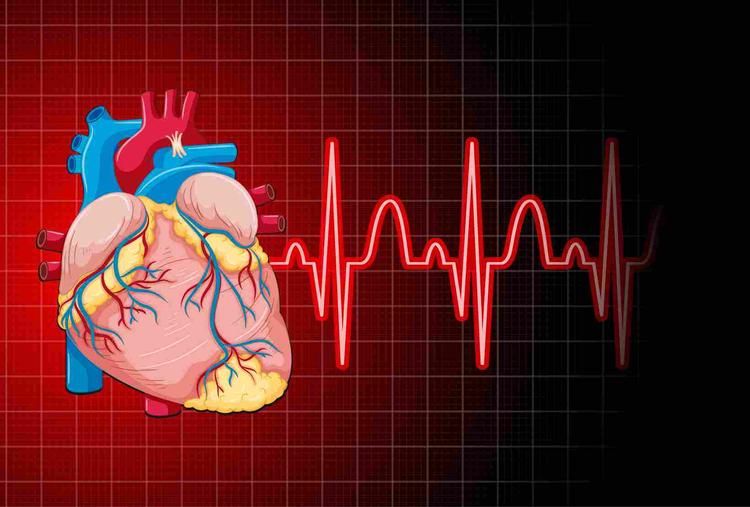Frequently Asked Questions About Heart Health- Take Control This World Heart Day

Medically Reviewed By
Dr Sohini Sengupta
Written By Komal Daryani
on Sep 29, 2023
Last Edit Made By Komal Daryani
on Mar 17, 2024

Heart Health Issues are continuously increasing and becoming a severe health concern. Recently, it has been observed that heart problems are not just an issue for older adults but are significantly increasing in youth.
Research and Facts reveal that Cardiovascular Diseases have increased by 10.19% in India over the past 5 years. It is especially growing in youth, and the reasons are many. While the world is raising its voice to Use Heart, Know Heart, We are ready to take you a step further to know your heart better.
Let us unveil all the answers about why, what, when, and how heart health risks have increased significantly.
Question 1: What are the risk factors of heart disease?
Answer: There are several reasons for increasing heart disorders. It can be bifurcated into two types: ones that can be controlled and others that can’t.
Risk factors to heart that can’t be controlled:
- Increasing age
- Women after menopause
- Being male
- Having a family history of cardiac disorders
Risk factors of increasing heart diseases that can be controlled:
- Smoking & Vaping
- Excessive Alcohol Consumption
- High Blood Pressure
- High Cholesterol
- Obesity
- Lack of Physical Activity
- Junk Food
- Stress
Important Tip: Preventing heart diseases triggered by lifestyle, diet, and underlying medical conditions is possible. So, you can seek periodic full-body checkups and ensure that all your health vitals are in good shape. Never allow bad habits like a sedentary lifestyle, alcohol, smoking, and junk food to impact your health.
Question 2: What Can Be Done to Prevent Heart Disease if The Risk of Developing Coronary Heart Disease Has Been Identified?
Answer: The risks of developing Coronary Heart Disease have been identified well in time; you shall follow the steps mentioned below to stay in good shape.
- Exercise Regularly:
Regular physical activities help control cholesterol levels and improve blood circulation, keeping your heart healthy.
- Maintain a Healthy Weight:
Obesity leads to the building of fatty material in the arteries, leading to clogging and disrupted blood flow, which often results in heart attack, so keeping your weight in check is always recommended.
- Quit Smoking & Vaping:
Smoking accelerates plaque formation in the blood vessels. As the arteries carrying blood to the heart are narrowed, it increases the heart risks.
- Say No to Junk Food:
The salt in junk food increases blood pressure, and saturated fats increase the risk of weight gain, diabetes, and other health conditions.
- Manage Stress:
Stress increases inflammation in the body, directly connected to fluctuating cholesterol levels. Also, stress leads to poor sleeping patterns, further aiding heart risks.
- Preventive Health Checkups:
The risk of heart disorders severely increases if there are unrecognized and unmanaged medical conditions like high cholesterol, diabetes, etc. A periodic full body checkup will help you take note of your health vitals and take the necessary steps per your personalized health conditions.
Important Tip: Apart from taking measures at your end, it is essential to consult the doctor for personalized assistance to keep your heart healthy.
Question 3: What dietary changes are necessary for better heart health?
Answer: Eating right is the key to better heart health and overall well-being. Here are the dietary changes you can make to maintain a healthy heart.
- Include a higher amount of fruits, vegetables, and legumes.
- Be mindful of including the grains in your diet. It is always recommended to include one grain at a time.
- Reduce trans fats from your diet by switching to unsaturated fats from saturated fats.
- Eat lean proteins and avoid foods high in cholesterol.
- Limit or avoid the consumption of simple carbohydrates like soda, sweets, and high-refined grains.
- Watch the salt intake, and do not sprinkle white salt on fruits, salads, or other foods, as it immediately spikes your cholesterol levels.
Important Tip: The dietary requirements, in terms of calories and nutrients, differ from one person to another, so the dietary changes must be as per your bodily requirements. You can avail of a complete body checkup and know your health vitals before planning your diet for a healthy heart.
Question 4: How Does High Cholesterol Impact Heart Health?
Answer: High cholesterol can significantly impact heart health in several ways. For a healthy heart, it's highly essential to monitor and control your cholesterol levels. Let us know the impact of high cholesterol on your heart health.
1. Formation of Plaques:
High levels of LDL cholesterol (commonly known as "bad" cholesterol) can lead to the buildup of fatty deposits, called plaques, on the walls of arteries. These plaques narrow the arteries, restricting blood flow to the heart muscle and increasing the chances of heart stroke or heart attacks.
2. Atherosclerosis:
The accumulation of plaques inside the arteries causes atherosclerosis, where arteries become hardened and narrowed. This restricts the flow of oxygen-rich blood to the heart, leading to angina (chest pain) and increasing the risk of heart attack.
3. Coronary Artery Disease (CAD):
Atherosclerosis in the coronary arteries, which supply blood to the heart muscle, can result in coronary artery disease. Reduced blood flow due to narrowed arteries can lead to chest pain, shortness of breath, and, in severe cases, heart attack.
4. Heart Attack:
If a plaque ruptures, it can cause a blood clot to form, blocking blood flow to the heart. This can lead to a heart attack, where a part of the heart muscle is damaged or dies due to lack of oxygen.
5. Stroke:
High cholesterol not only affects the heart but also increases the risk of stroke. If plaques rupture in the arteries supplying the brain or a clot forms due to cholesterol buildup, it can lead to a stroke, causing brain damage.
6. Hypertension:
High cholesterol can contribute to high blood pressure (hypertension), another significant risk factor for heart disease. Hypertension strains the heart and can lead to various heart-related complications.
7. Reduced Blood Flow:
Narrowed and hardened arteries reduce the ability of the heart to pump blood efficiently. This can lead to fatigue, shortness of breath, and decreased physical endurance.
8. Peripheral Artery Disease (PAD):
Cholesterol buildup can occur in arteries outside the heart, affecting limbs. In PAD, reduced blood flow to the legs and feet can cause pain, numbness, and, in severe cases, tissue damage and amputation.
Important Tip:
Regularly monitoring cholesterol levels through comprehensive lipid profile tests is necessary to keep your heart healthy and happy.
Question 5: Are There Any Health Checkups that Detects Heart Risk at an Early Stage?
Answer: Yes, there are comprehensive preventive health checkups to detect heart risks. The two prominent tests offered at Redcliffe Labs are detailed as follows.
- NT-Pro BNP as a Predictive Cardiac Risk Marker (Diabetes Focus):
NT-Pro BNP is a vital cardiac risk marker test, especially for individuals with diabetes. Elevated levels of NT-Pro BNP indicate potential heart stress and can serve as an early warning sign, allowing proactive measures to be taken. Diabetes increases the risk of heart complications, making this test particularly crucial for those with diabetes. By identifying cardiac strain early, healthcare providers can tailor interventions to mitigate risks effectively and enhance the cardiovascular health of individuals managing diabetes.
- High Sensitivity Troponin I: A Crucial Risk Marker for All Age Groups
High Sensitivity Troponin I is a pivotal predictive risk marker test applicable to individuals of all ages, regardless of any evident heart disease symptoms. It is especially essential for those with a family history of heart disease, as genetic predisposition can significantly impact cardiovascular health. This test detects minimal troponin levels, a protein released into the bloodstream during heart muscle damage. By identifying even subtle signs of heart strain, healthcare professionals can initiate preventive measures, facilitating early intervention strategies and supporting the long-term heart health of individuals, particularly those at higher familial risk. Regular screenings for individuals with a family heart disease history are imperative for proactive health management.
Important Tip: With increasing heart risks every day, it has become essential to take charge of your health and protect your heart with the predictive risk markers test. Don't wait for symptoms; take proactive measures with precautions.
Get Answers to All Your Health Queries With Your Health Wisher Redcliffe Labs:
Redcliffe Labs keeps your health a priority. Every month, we organize a health par charcha session with our doctors and medical experts. On the occasion of World Heart Day 2023, which is themed Use Heart, Know Heart, Redcliffe Labs has organized the Dil ki Suno campaign to promote the importance of heart health among everyone, especially the youth who live with a myth that heart diseases impact only the old.
However, ignorance towards our health, poor diet, and sedentary life have led to increasing heart attacks in youth also.
Know from Dr. Ashok Rattan, Why? Watch the complete video to get your answer



